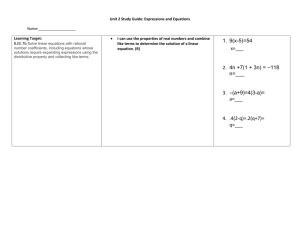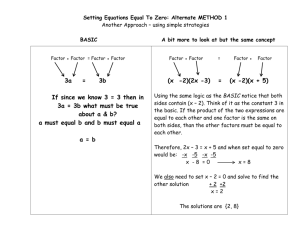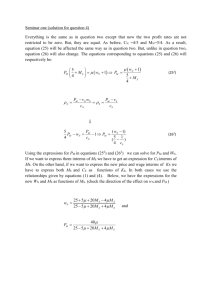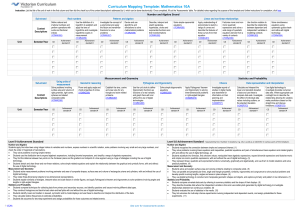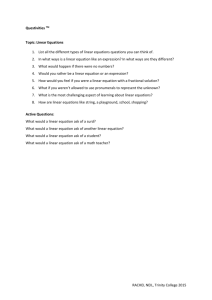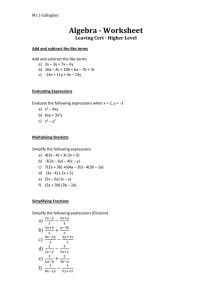Algebra - Worksheet Junior Cert
advertisement
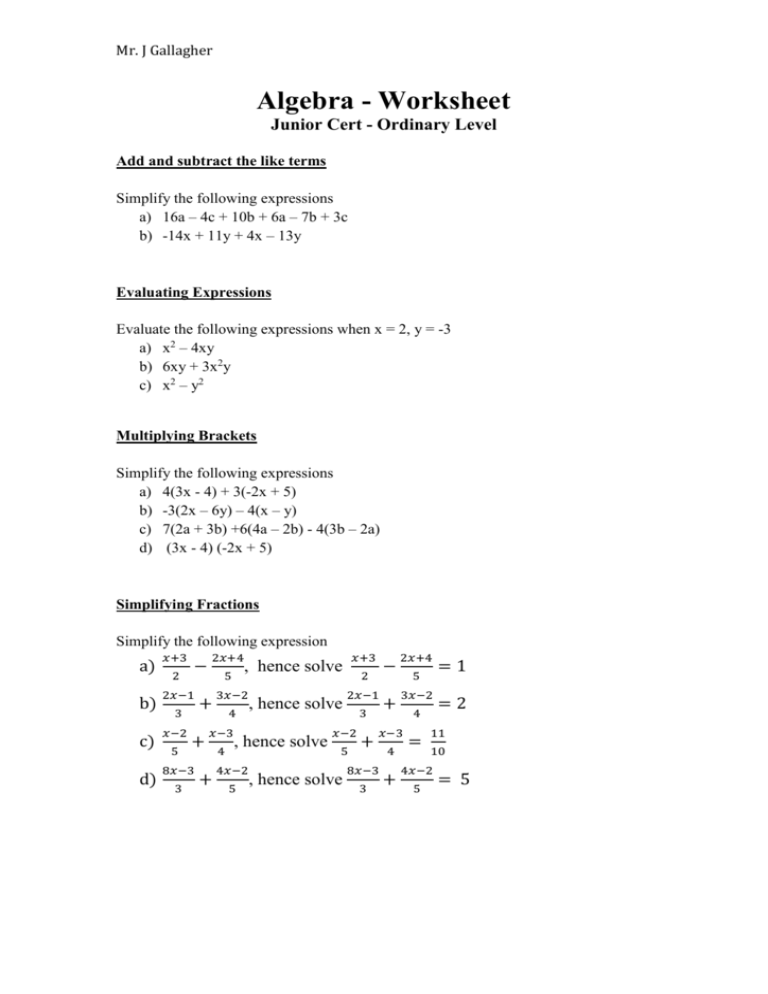
Mr. J Gallagher Algebra - Worksheet Junior Cert - Ordinary Level Add and subtract the like terms Simplify the following expressions a) 16a – 4c + 10b + 6a – 7b + 3c b) -14x + 11y + 4x – 13y Evaluating Expressions Evaluate the following expressions when x = 2, y = -3 a) x2 – 4xy b) 6xy + 3x2y c) x2 – y2 Multiplying Brackets Simplify the following expressions a) 4(3x - 4) + 3(-2x + 5) b) -3(2x – 6y) – 4(x – y) c) 7(2a + 3b) +6(4a – 2b) - 4(3b – 2a) d) (3x - 4) (-2x + 5) Simplifying Fractions Simplify the following expression a) b) c) d) 𝑥+3 2 − 2𝑥−1 3 𝑥−2 5 3 𝑥+3 5 2 + + 8𝑥−3 2𝑥+4 − 3𝑥−2 2𝑥−1 4 3 𝑥−3 + , hence solve 4 , hence solve , hence solve 𝑥−2 5 + 5 3𝑥−2 4 𝑥−3 4𝑥−2 8𝑥−3 5 3 , hence solve + 2𝑥+4 4 + = =2 11 10 4𝑥−2 5 =1 = 5 Mr. J Gallagher Factorising Common Factors - Factorise the following expressions a) x2 + 2x b) 2y2 + 4y c) 4xy – 12x2 d) 3x2y – 15xy Difference of two squares - Factorise the following expressions a) x2 – 49 b) y2 – 144 c) 4x2 – 25 d) 36y2 – 16x2 Grouping factors - Factorise the following expressions a) ax + ay + bx + by b) 3ax – 2ay + 3bx – 2by c) 4x – 4y + abx – aby Factorising quadratics - Factorise the following expressions a) x2 – x – 20 b) x2 + 3x – 10 c) 4x2 + 4x + 1 d) 14x2 + 3x – 2 Quadratic equations - Solve the following equations a) x2 – x – 20 = 0 b) x2 + 3x – 10 = 0 c) 4x2 + 4x + 1 = 0 d) 14x2 + 3x – 2 = 0 Mr. J Gallagher Linear Equations Solve the following equations a) x + 2 = 0 b) 4x + 3 = 15 c) 3y – 6 = 18 d) 3x – 1 = 2x + 11 Linear equations with brackets - Solve the following equations a) 3(x + 2) = 0 b) -3(4x + 3) = 15 c) 3(2y – 6) = 18 d) 4(x – 2) = 3(2x + 4) e) 3(x – 2) = 7(x + 5) – 13 f) 2(2x + 1) – 3 (x – 1) = 9 Simultaneous Equations Linear Simultaneous Equations – Solve the following for x & y a) x – y = 1 2x + y = 11 b) 3x + 2y = 8 2x – 2y = 2 c) 2x + 3y = 8 5x + 3y = 11 d) 4x + y = -2 3x + y = -1 Inequalities Linear – Solve the following inequality and graph your solution on a number line a) 2x – 3 ≤ 5, x𝜖R b) 3x – 1 > 8, x𝜖N c) 4x + 3 < 3x + 10, x𝜖R d) 6(x + 4) > 2(x – 3) x𝜖R Mr. J Gallagher Evaluating Functions If the function f(x) = 5x – 2, find a) f(-1) b) f(3) c) f(x) = 3 If the function f(x) = x2 – 6, find a) f(-1) b) f(3) c) f(x) = 3 Graphing Functions Graph the following linear functions a) f: x 2x + 1 in the domain, -3 ≤ x ≤ 3. Find the value when f(x) = 0 Find the value when x = 2.5 b) f: x 3x – 2 in the domain, -2 ≤ x ≤ 4. Find the value when f(x) = 0 Find the value when x = 2.5 Graph the following quadratic functions a) f: x x2 – 4x – 5 in the domain, -3 ≤ x ≤ 3. Find the values when f(x) = 0 Find the value when x = 2.5 b) f: x 2x2 + 4 in the domain, -3 ≤ x ≤ 3. Find the values when f(x) = 0 Find the value when x = 2.5 Mr. J Gallagher Real Life Examples 1. Brendan thinks of a number, adds three and the answer is fifteen. Represent this statement as an equation. Solve the equation and check your answer. 2. Ryan thinks of a number then subtracts five and the answer is ten. Represent this statement as an equation. Solve the equation and then check your answer. 3. A farmer has a number of cows and he plans to double that number next year, when he will have twenty-four. Represent this statement as an equation. Solve the equation and check your answer. 4. A new student enters class and the class now has twenty-five students. Represent this statement as an equation. Solve the equation and check your answer. 5. The temperature increases by eighteen degrees and the temperature is now fifteen degrees. Represent this statement as an equation. Solve the equation and check your answer. 6. A farmer doubles the amount of cows he has and then buys a further three cows. He now has twenty-nine. Represent this statement as an equation. How many did he originally have? 7. Emma and her twin brother will have a total age of forty-two in five years time. Represent this statement as an equation. How old are they at the moment? 8. Mark had some cookies. He gave half of them to his friend John. He then divided his remaining cookies evenly between his other three friends each of whom got four cookies. How many had he originally?

